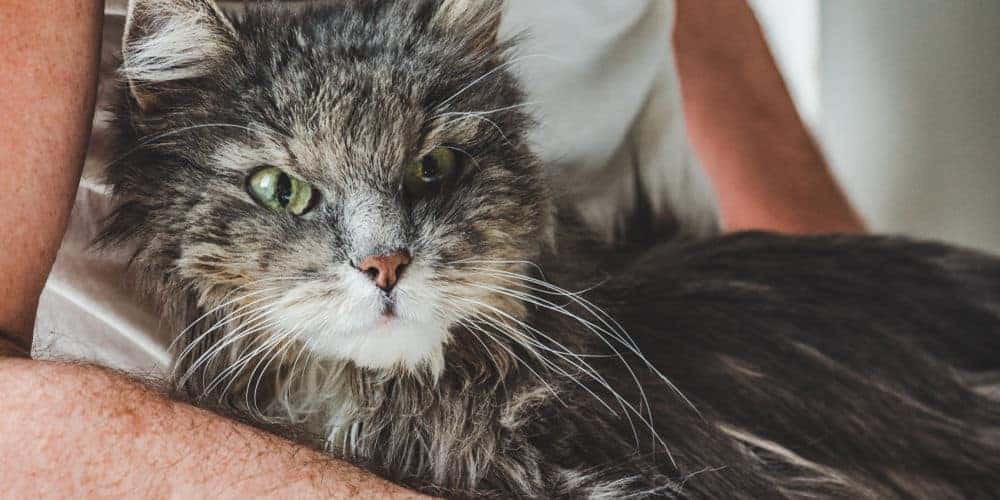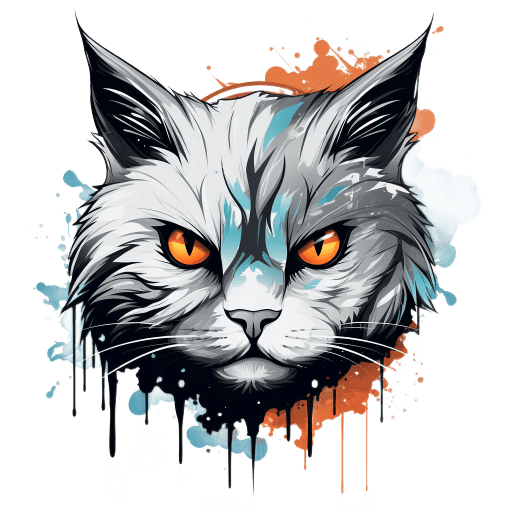What do You Feed an Old Cat to Gain Weight?

One of the most important aspects of cat care is food selection. If you have an elderly cat that’s fairly slender and you’re wondering what you should feed her to gain weight, this post is for you.
We’re going to discuss everything you need to know about feeding an elderly feline, including potential reasons for her lack of appetite and weight loss.
Depending on your cat’s health status, the best solution to help an old cat gain weight is to feed her a high-quality protein diet consisting of healthy meats such as salmon, chicken, turkey, fish, and the like, along with several plant proteins. Good luck!
Cat Attitudes is reader-supported. When you buy through links on our site, we may earn an affiliate commission.
Foods That Help Old Cats Gain Weight
If you want your old cat to gain weight, you should start feeding her easy-to-digest, protein-rich, calorie-dense food. Avoid dry cat food as much as possible as it doesn’t contain the sufficient dietary carbohydrates older cats need to gain weight.
Instead, search for wet cat food that has high protein and caloric value. You can also feed your cat kitten food, as growing felines tend to require high-calorie food.
Another great option is to add high-calorie supplements to her daily diet. Doing so will help boost your cat’s daily calorie consumption and, therefore, increase her weight.
High-calorie pet supplements usually come in gel form. A single dose usually contains a high concentration of healthy protein, vitamins, and minerals.
Many cats don’t immediately trust anything that smells remotely like medicine, so you may have to place the supplement directly in her mouth for the first few weeks. Once she gets used to it, you may start incorporating it into her food.
Best High-Protein and Calorie Foods
Some of the best high protein foods include sources of meat such as salmon, chicken, turkey, and lamb. Internal organs like liver and kidney are a plus, too.
Taurine and arginine are equally important in a cat diet, as they promote health and blood health consecutively. You should find this ingredient listed on the can or bag’s ingredient list.
Other than animal-based protein, another main source of protein used in cat food is plant-based protein. According to PetMD, plant protein in cat food includes corn gluten, wheat gluten, and soybean meal. Rice protein concentrate is equally important, as well.
Keep in mind that cats are obligate carnivores, which means their bodies have adapted to a strict meat diet. So, you shouldn’t ever replace animal protein with plant protein. The two are to be served hand-in-hand.
Dr. Karen Becker, a proactive and integrative wellness veterinarian, states that raw or gently cooked fresh food is the best type of food for senior cats. She also says that dehydrated or freeze-dried balanced food can be given if fresh food is unavailable, as long as it’s sufficiently reconstituted with water.
Possible Reasons Why Old Cats Lose Weight
Before changing your cat’s diet, it’s important to first understand the reason why your elderly cat is losing weight.
Most cats gain weight as they age, so it’s worth having your feline checked by a veterinarian to shed some light as to why she is becoming disconcertingly thin.
Some of the most common medical conditions related to weight loss include the following:
Diabetes
Diabetes occurs when a cat’s body fails to produce enough insulin to balance her blood sugar or glucose levels. When this occurs, her body starts burning fat and muscle at an alarmingly quick rate, thus causing an overall reduction in body weight.
According to PetsWebmd, feline diabetes is estimated to affect 0.5% to 2% of the feline population. The biggest signs and symptoms of diabetes in cats include increased thirst, urination, lack of appetite, vomiting, lethargy, and general loss of interest.
If a cat is diagnosed with diabetes, her diet should be high in protein but low in carbs. Dry cat food usually has a high carbohydrate content as it’s mostly made of starch, and therefore should be avoided.
Intestinal Parasites
Intestinal parasites, also known as gastrointestinal parasitism, are a relatively common problem for cats young and old. It has a prevalence rate as high as 45% and is likely to affect a cat at least once or twice in her life.
Intestinal parasites are usually caused by worms (roundworms, hookworms, tapeworms) or one-celled organisms (Isospora, Giardia, Toxoplasma).
In mild cases, these parasites may cause diarrhea, vomiting, and weight loss. If left untreated, however, severe parasitism may cause anemia, inflammatory bowel disease, and even death.
Thankfully, intestinal parasites are relatively easy to cure. A vet may prescribe oral medication to be taken once every day, or they may prescribe an injection. Complete recovery usually takes anywhere between a week to several months.
Gastrointestinal Disorders
Gastrointestinal disorders come in a variety of conditions, including inflammation of the stomach (gastritis), inflammatory bowel disease, malabsorption, and gastrointestinal obstruction and ulcers.
The most common signs of cat digestive disorders are similar to those of gastrointestinal parasitism: diarrhea, vomiting, weight loss, lethargy, and loss of appetite.
Treatment usually consists of rehydration, blood electrolyte restoration, and antibiotics. During this time, your vet may advise you to feed your cat easily digestible high-protein food.
Hyperthyroidism
Hyperthyroidism is one of the most common feline diseases found in cats over the age of 12. In a nutshell, hyperthyroidism is caused by the abnormal production of thyroid hormone by the cat’s thyroid glands.
The biggest indication of hyperthyroidism is weight loss (despite an increased and insatiable appetite), diarrhea, vomiting, increased thirst and urination, out-of-character aggression, and matted or greasy hair.
During this period, a cat may also show restlessness or hyperactivity, difficulty breathing, and depression.
Similar to most other common cat diseases, hyperthyroidism is curable. Treatment includes medication, radioactive iodine therapy, and, in more severe cases, surgery.
If your older cat is diagnosed with hyperthyroidism, limiting the amount of iodine in her diet is highly recommended.
Organ Failure
Organ failure can result in significant weight loss in older cats. Conditions such as kidney disease, liver failure, and Multiple Organ Dysfunction Syndrome (MODS) are some of the most well-recognized critical feline illnesses.
Symptoms include weight loss, weakness, lack of appetite, diarrhea, vomiting, excess thirst, and bad breath.
Toothache
Another common indication of weight loss is toothache. If your cat seems healthy but suddenly stops eating for no apparent reason, she might be experiencing a toothache.
The biggest indications of toothache include bad breath, pawing at the mount, sensitivity to being touched, and red and inflamed gums (gingivitis).
Cats who appear to experience severe pain might have stomatitis, periodontal disease, and tooth resorption, all of which may cause infections and chronic pain.
Similar to humans, cat dental conditions are usually treated with antibiotics or steroids. In severe cases, tooth extraction may be required.
Psychological Issues
Cats who are under extreme anxiety, stress, or depression may experience an increased lack of appetite, which often results in weight loss.
Some of the most common reasons for psychological stress include the loss of a loved one, excessive noise, dirty sleeping areas, and dirty food dishes. It may also be brought about due to an underlying illness or injury.
Possible signs of depression and anxiety in cats include changes in vocalization, body language (held-back ears, tucked tail, hair standing on end), unprovoked aggression or fear, excessive sleep, and sudden change in appetite, or lack thereof.
Final Thoughts
As your cat grows older, the possibility of feline age-associated diseases and health problems increases.
If you’ve noticed a significant change in your cat’s weight and eating patterns, we highly recommend you book an appointment with your vet to rule out any underlying medical condition before changing your cat’s diet.
Luckily, there’s a wide variety of cat food designed to meet an elderly cat’s daily dietary and nutritional needs.
